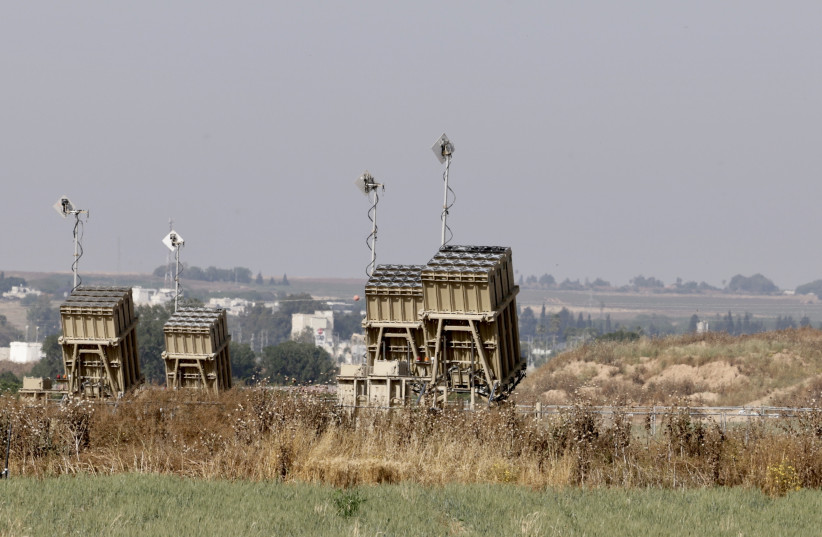It’s all about Iran. Military commentators appearing in round-the-clock media coverage last week acknowledged that the Palestinian Islamic Jihad (PIJ) suffered a severe blow in Operation Shield and Arrow, but stressed Israel’s lack of a long-term Gaza Strip strategy. What most of these pundits fail to understand is that it’s all about Iran.
Preventing a nuclear Iran was, is and will be the only show in town for the foreseeable future. Everything else is secondary, including the periodic skirmishes on Israel’s southern and northern borders. This is why the focus is not on defusing Iran’s proxies but rather on preventing Iran from acquiring nuclear weapons.
For weeks leading up to the operation, Iran propagated that Israel was weak. “The demise of the Zionist entity will come sooner than anticipated,” read the headline in the Iranian regime’s mouthpiece daily publication, Kayhan, alluding to anti-government protests in Israel, including calls for civil disobedience by former IDF generals. “Israel is on the verge of civil war and their armed forces are crumbling from within,” was reiterated in Iran’s state-run press.
Operation Shield and Arrow proved Iran wrong. Not only did Israel show, once again, that in times of crisis, Israelis stand united, but the campaign also exposed Iran’s weakness.
It was different from previous cycles and can change the course of the future in the Middle East. We saw a unique convergence of precise intelligence, and technological and operational capabilities with proactive government decision-making. Within three seconds, the top three Palestinian Islamic Jihad commanders were simultaneously targeted in three different locations. There is probably no other military with such proven actionable intelligence capabilities, and Israel’s friends and foes surely took note.

When the PIJ subsequently fired rockets indiscriminately at Israeli civilians and city centers, two more terrorist commanders were taken out. The total number is six; three at the outset, then two more, then another one. Within five days, the entire leadership of the terrorist organization was targeted and 17 facilities where rockets were manufactured and stored were destroyed. That left little room for ambiguity as to the fate of those who indiscriminately target Israeli civilians.
THERE IS nothing that the tyrants in Tehran would have wanted more than for Israel to get bogged down in clashes with their terrorist proxies in Gaza, Lebanon and Syria, not to mention the ones in Nablus and Jenin. The ayatollahs did everything in their power to push Hamas and Hezbollah into the fray, but the two terrorist organizations chose instead to stay on the sidelines and let the PIJ fight it out on their own.
Regardless of whether Hamas and Hezbollah were deterred by Israel or simply saw satisfaction in seeing a rival terrorist group clobbered, one thing is clear: Hamas and Hezbollah leadership feared they would face a similar fate as the top three PIJ commanders and thus exposed Iran’s own weakness. It turns out that Hamas and Hezbollah’s leaders, like the ayatollahs themselves, are fearless with the lives of others but are much more concerned with their own lives.
Despite its efforts, Iran’s influence was limited to convincing the Islamic Jihad’s leadership abroad (ensconced in luxury hotels) to turn down Egypt’s initial ceasefire efforts, to prolong the skirmish with Israel by three days, and to lose scores of additional terrorists and facilities in the process.
Israel’s targeted killing policy proved effective and will hopefully deter future escalations. Once again, Israel showed the world it tries its best not to harm Palestinian civilians, while Palestinian terrorists do their best to target Israeli civilians and hide behind their own. That is the reason for the limited calls heard this time in the international community to put an end to the PIJ’s drubbing.
Importantly, key actors and potential peace partners in the region, like Saudi Arabia and others, got reassurance after seeing a glimpse of Israel’s power. They surely have no illusions as to where the future lies.
Israel has grown into a global economic and technological power, with a per-capita GDP that surpasses countries like Italy, France and Germany. As a hub of cutting-edge technology and a gateway to Europe and America, any responsible leader who has his people’s future in mind would seek peace with Israel.
While Tehran and the PIJ lick their wounds, Israel and their potential peace partners, along with their longstanding partners, should bring an end to the Arab-Israeli conflict and stop Iran’s pursuit of nuclear arms.
The writer is a former head of the International Institute for Counter-Terrorism’s office in Washington and a senior analyst at Acumen Risk Ltd., a risk management firm.
